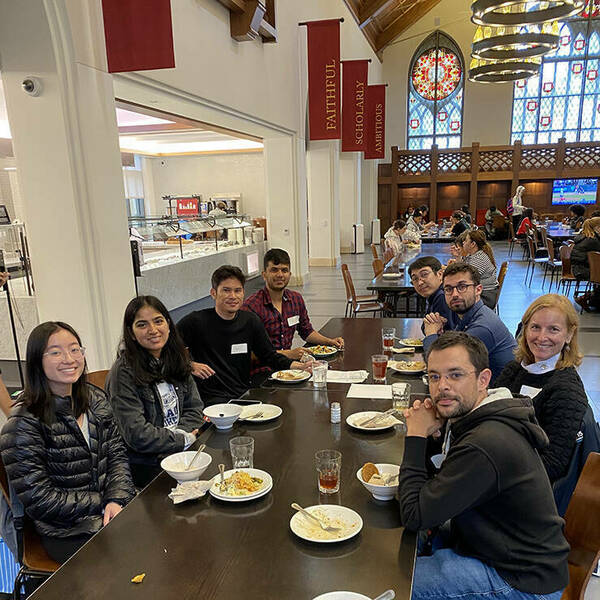The first student cohort in the CI Compass Fellowship Program (CICF) wrapped up with the Spring semester. Six undergraduate students, from the University of Notre Dame and the University of Southern California, finished their session by successfully giving research presentations on April 13, 2022.
CICF, which was launched in the Spring 2022 semester, serves students who are pursuing studies in computer science, information science, data science, applied mathematics, embedded systems, communications, and social sciences related to cyberinfrastructure with a unique student research and fellowship experience.
The students gave their presentations on the data lifecycle processes of a number of National Science Foundation (NSF) Major Facilities (MFs).
The student presentations included:
- Regional Class Research Vessels (RCRV) by Mia Patel, University of Notre Dame, and Khushi Choudhary, University of Southern California
- National Center for Atmospheric Research (NCAR) by Nona Nersisyan, University of Southern California, and Ryan (Yuzhe) Wang, University of Southern California.
- National Solar Observatory (NSO) by Christy Ko, University of Southern California, and Edward Lin, University of Southern California.
“The CI Compass Fellowship program is truly an impactful experience for the students. They research the specific data lifecycle at working major facilities to see how the cyberinfrastructure supports the data, what that cyberinfrastructure entails, and what CI challenges the particular major facility face,” said Angela Murillo, co-Principal Investigator (PI) for CI Compass, Co-Director of the CICF Program, and Program Director for the Applied Data and Information Science Program at Indiana University-Purdue University Indianapolis. “The fellowship provides the students experience with the skills needed to potentially work in scientific environments. Additionally, the fellowship shows students how meaningful work in the scientific world can be, where people are passionate about their science missions.”
In addition, the students learned about the work that members of the CI Compass team conduct as a part of CI Compass as well as in their university roles.

“Before the program, I thought that doing research would be too hard, but the people in the program changed my mind about that,” said Nersisyan. “Anyone can do research as long as they have a great team to help them.”
Further, the students had the opportunity to engage with many professionals through guest speakers from the NSF MFs, CI Compass institutional partners, and the greater CI and scientific community.
Speaking about the experience, Ewa Deelman, principal investigator (PI) of CI Compass and a Research Director at the University of Southern California’s Information Sciences Institute, said, “We had representatives from multiple NSF MFs come into the virtual classroom to talk about being a cyberinfrastructure professional working in an MF. They spoke about what kind of work they do, and what challenges they work through. The students found this was an important and interesting part of the Fellowship’s program, as the students had the chance to ask questions and learn what it means to work in this important and growing field.”
With the first semester of the program concluded, the students will continue with their studies, with some returning for the Summer and Fall for a project-based experience. Many have changed their perceptions about what working in the cyberinfrastructure space can look like.
“Before joining the program, I was curious about many fields within computer science and technology,” said Ko. “I did not know much about cyberinfrastructure, but I want to continue my interest in the research ecosystem after learning about it.”
The CI Compass Fellowship program spans 12 weeks in the Spring semester, and 6 weeks into the summer. Undergraduate students can earn course credits for the Spring semester curriculum, with a paid internship option over the summer. Students are also eligible to participate in a professional conference. The program was hosted remotely and in-person on the students’ campuses, with discussions and presentations taking place online.
For more information about the CI Compass Fellowship Program, visit ci-compass.org/about/fellowships/.
About CI Compass
CI Compass is funded by the NSF Office of Advanced Cyberinfrastructure in the Directorate for Computer and Information Science and Engineering under grant number 2127548. Its participating research institutions include the University of Southern California, Indiana University, Texas Tech University, the University of North Carolina at Chapel Hill, the University of Notre Dame, and the University of Utah.
To learn more about CI Compass, please visit ci-compass.org.
Contact:
Christina Clark, Research Communications Specialist
CI Compass / Notre Dame Research / University of Notre Dame
cclark26@nd.edu / 574.631.2665
ci-compass.org / @cicompass
Originally published by at ci-compass.org on July 12, 2022.